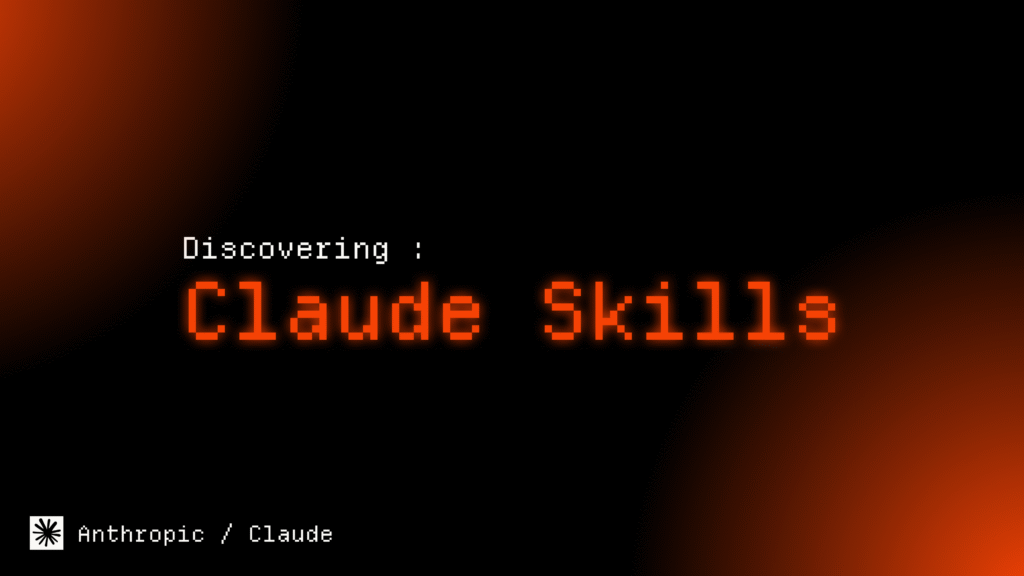Tired of repetitive tasks and poorly optimized scripts? While “normal” AI help you, it also can’t adapt fully to your context. And Anthropic AI might have find a solution for that.
Anthropic AI just unveil it’s new feature for Agentic AI. “Skills” They announced it on their blog as well as their X account.
New on the Anthropic Engineering Blog: Our tips for developers on using Agent Skills, a new way to extend Claude's capabilities with instruction folders, scripts, and resources:https://t.co/2liRUo4AWO
— Anthropic (@AnthropicAI) October 16, 2025
Claude Skills are revolutionizing AI Agents by transforming Claude into a versatile expert that can execute code, structure data, or fill out PDF forms following strict guidelines.
Built on a three-tier progressive disclosure structure, each Skill contains specialized instructions, scripts (Python, Bash), and preloaded metadata for optimized decision-making.
Discover how this innovation from Anthropic, available on Claude.ai and the API Developer Platform, pushes AI boundaries by combining enhanced security, reliable execution, and seamless integration with business tools like Notion or Box.
What are Claude Skills?
Claude Skills represent a major leap forward in AI agent evolution. They’re organized folders containing specialized instructions, scripts, and optimized resources that the assistant can dynamically load.
Skills give Claude access to specialized instructions, scripts, and optimized resources for specific tasks.
These capabilities transform general-purpose agents into specialized ones by encapsulating procedural expertise. This approach enables Claude to become an autonomous agent, capable of efficiently executing complex tasks using specialized resources.

How to activate Claude Skills ?
To activate Claude Skills, you need to go to settings -> Capabilities -> Scroll down -> and make sure you activated “Code execution and file creation” and then, activate skills.
There are “precharged” skills that are already in your account. You can test them to see what they do. But you need to activate them by toggling off/on the specific skill you want to use. By default, they’re all turned off.
You can also upload skills. For the moment, the only file supported is a .zip file, with a “SKILL.md” file at root level.
- .zip files that contain one “skill.md” file at the root level of the .zip file
- the “SKILL.md” file have to contains a skill name and a description, both formatted in YAML.

The Evolution Toward Agentic AI
Anthropic’s Skills mark a turning point in the Agentic AI trend. They allow Claude to break down general instructions into more specific units, making context management easier.
Anthropic has officially announced “Claude Skills,” a feature that makes capabilities composable, portable, and efficient. This progressive disclosure system ensures that only necessary information is loaded at the right time.
Skills pave the way for more autonomous agent capabilities, fundamentally transforming how Claude interacts with specific tasks and externalized resources.
How Skills Work: The Progressive Disclosure Principle
Core Structure of a Claude Skill
A Skill is based on a directory containing a SKILL.md file. This file starts with a YAML frontmatter block including mandatory metadata: name and description. This metadata, preloaded in the system prompt, allows Claude to quickly identify a Skill’s relevance without loading its full content.
A Skill can also include subfolders like resources/ or templates/ to store supporting files (examples, forms). These resources remain accessible only when the task requires them, avoiding unnecessary context clutter.
The Progressive Disclosure Mechanism
The progressive disclosure system allows Claude to access only necessary information, optimizing context management. This process works across three levels:
Level 1: Metadata (name and description) is integrated into the system prompt, providing an overview of available Skills.
Level 2: If a Skill is relevant, the entire SKILL.md file is loaded to provide detailed instructions.
Level 3 and beyond: Additional files (e.g., forms.md) are accessed only when specifically needed, like filling out a PDF form.
This approach makes Skills scalable, as the amount of context is unlimited: only required elements are loaded, reducing the impact on tokens used.
Executable Code Integration: Power and Versatility for Claude Skills
Script Execution for Specific Tasks
Claude Skills allow the AI to execute Python or Bash scripts directly—a major asset for deterministic operations. For example, a pre-written script can extract fields from a PDF without Claude having to load the entire file into context.
This capability gives Claude unprecedented precision: data sorting, file manipulation, or automating repetitive tasks become possible through specialized instructions. Skills can include executable code (via tools like Bash or Python), ensuring increased reliability compared to purely text-based generation.
Advantages of the Hybrid Approach
The strength of Claude Skills lies in their layered structure. The Markdown/YAML format simplifies configuration, while code execution ensures precision. This combination avoids overloading the context: code is only loaded on demand, optimizing token usage.
Unlike methods based solely on contextual instructions, this hybrid approach combines flexibility and efficiency. Skills transform Claude into an adaptable agent capable of handling complex tasks without sacrificing performance. Modularity ensures smooth scaling, while security remains a priority when installing third-party Skills.
Use Cases and Deployment for Claude Skills : From Theory to Practice
Availability and Practical Applications
PlatformTarget UsersSkill Use ExamplesClaude.aiPro, Max, Team, EnterpriseDocument processing (Excel, Word, PDF), compliance with organizational guidelinesClaude CodeDevelopers, technical teamsExtending team workflows, sharing via version controlClaude API Developer PlatformDevelopers, integratorsIntegration with external tools (Notion, Box), task automation
Skills optimize repetitive tasks in professional environments. On Claude.ai, Pro or Enterprise users can create Excel reports that comply with standards. Claude Code integrates Python scripts to automate tests. The API connects Claude to internal systems for data processing.
Creating and Managing Skills
- Skills are available via Claude.ai for Pro, Max, Team, and Enterprise users
- They integrate with Claude Code to extend team workflows
- The API enables their integration into third-party apps
The skill-creator tool guides folder creation and SKILL.md file formatting. Despite their simplicity, Skills are composable (stackable) and portable (single format). Administrators can enable these features organization-wide, ensuring security.
Security and Governance: A Critical Adoption Issue
Risks Related to Code Execution
Since Skills can provide Claude with new capabilities, including code execution, it’s crucial to install Skills only from trusted sources.
Risks like arbitrary system command execution have been identified with malicious Skills—an attack vector was quickly identified, allowing arbitrary system command execution. This underscores the importance of security in Skills management, as uncontrolled access can compromise data or systems.
Auditing and Controlling Deployed Skills
For team or enterprise environments, it’s imperative to audit Skills from less reliable sources. This involves carefully examining the code and instructions included in each Skill, especially when they come from third parties.
Administrators must implement rigorous processes to control and govern Skills usage. This includes analyzing attached files, verifying executable scripts, and adopting systematic review practices. In professional contexts, these measures minimize risks of intrusion or sensitive data leaks.


